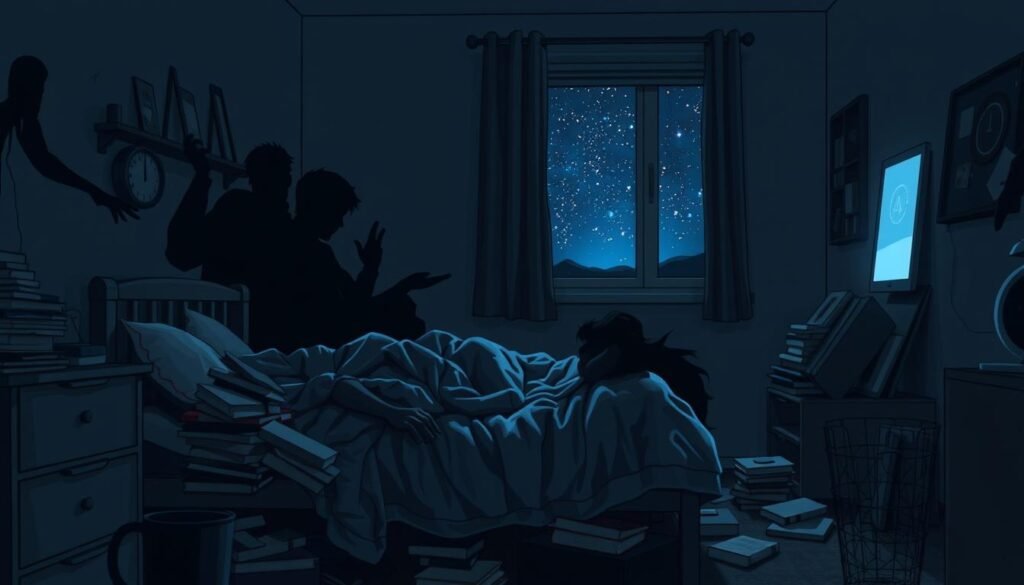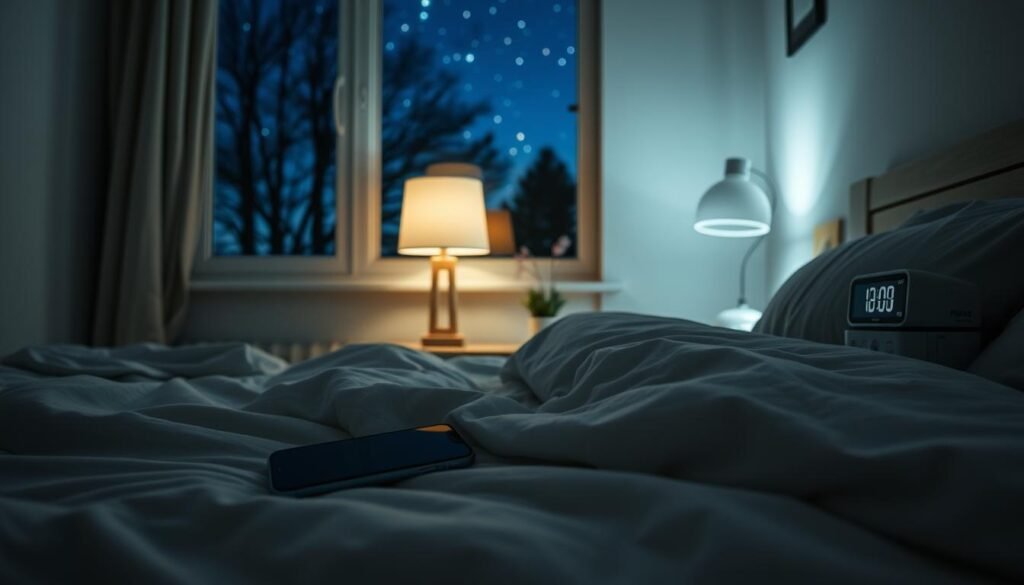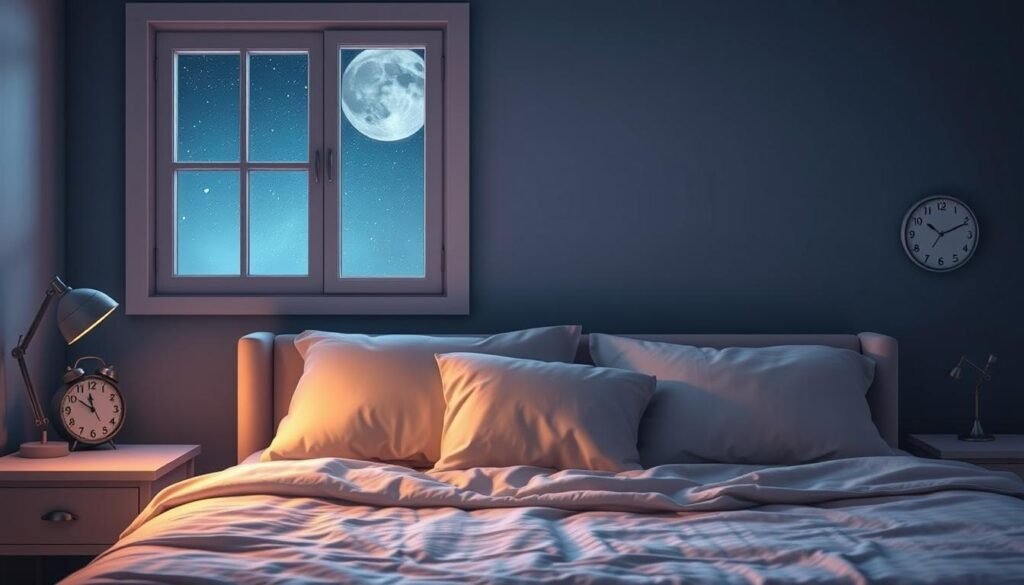Did you know that nearly seven in ten high schoolers in America don’t get enough sleep on school nights? This fact points out a growing worry about teens and insomnia. It affects their well-being badly. These years are key for growth in body and mind. Yet, many teens can’t sleep well due to packed days. Early school, late homework, and time on screens contribute to this issue.
This guide will highlight the problem of insomnia in young people. We’ll look at its causes, effects, and how to get better sleep. It’s crucial that both kids and their parents realize how important sleep is during the teen years. Better understanding and tackling sleep issues can boost mood, grades, and health overall.
Key Takeaways
- Teens are at the highest risk of sleep deprivation due to various factors.
- Insomnia can lead to long-term health issues, including diabetes and depression.
- A large majority of teens could benefit from sleep interventions.
- Adolescents need 8-10 hours of sleep per night for optimal health.
- A significant number of teens are affected by sleep problems, especially during high school.
Understanding Insomnia in Teens
Many teenagers struggle with insomnia. About 70-80% face sleep issues, mostly having trouble falling or staying asleep. Teen bodies naturally want to sleep later, leading to issues like not feeling sleepy until after 11 p.m. This delay can cause daytime problems like tiredness and moodiness.
Teen sleep issues often include taking a long time to fall asleep and waking up often at night. Stress, caffeine, and early school starts make it harder for them to get enough sleep. They usually need 8 to 10 hours but often don’t get it because of homework.
Also, mental health problems like anxiety can make sleep worse. Health issues such as asthma or GERD also affect sleep. It’s important to know insomnia signs to tackle them early.
Improving sleep practices can help teens sleep better. This includes a regular sleep schedule and less screen time before bed. Treatments like Cognitive Behavioral Therapy (CBT) focus on changing bad sleep habits. If insomnia lasts a long time and affects daily life, getting help is important. For more information, check out this resource.
The Importance of Sleep for Teens
Getting enough sleep is crucial for teens’ health. Teens need 8 to 10 hours a night. This is more than younger kids need. Michael Crocetti, M.D., says teens should get about 9 to 9½ hours. Not sleeping enough can cause bad grades and make mood disorders more likely.
Sleep affects a teen’s health, thinking, and feelings. Not sleeping enough makes you tired and hurts your ability to think and remember. Teens might act like they have ADHD if they don’t sleep enough. Not sleeping enough can also make teens take more risks, like using drugs or not being safe.
Stress and worry can also mess up a teen’s sleep. About 56% of teens feel stressed and anxious every day. This can make sleep problems worse. Lack of sleep in teens can start a cycle of feeling down and sleeping badly.
It’s important for teens to sleep enough to do well in school and feel emotionally stable. Creating a good sleep space and a calming bedtime routine helps. Pediatricians are key in helping teens sleep better by looking for sleep problems and giving advice.
| Effect of Sleep Deprivation | Potential Consequences |
|---|---|
| Poor Academic Performance | Lower grades and decreased focus |
| Increased Mood Disorders | Anxiety, depression, and hopelessness |
| Behavioral Issues | Risky behaviors, substance use |
| Health Risks | High blood pressure, weight problems |
Factors Contributing to Teens and Insomnia
It’s important to know the sleep challenges teens face. Their sleep is affected by their biological clocks, changes in their circadian rhythms, early school start times, and their active social lives. All these factors play a big part in why many teens suffer from insomnia.
Biological Clocks and Circadian Rhythm
Teenagers go through key changes in their biological clocks during puberty. This leads them to prefer staying up late and waking up later. However, this clashes with what society expects from them. They end up having a hard time adjusting to early school start times. This makes getting the needed 8 to 10 hours of sleep tough.
Impact of Early School Start Times
School schedules can make sleep problems worse. With classes starting early, students have to wake up before their bodies are fully rested. This often means they don’t get enough sleep. It can result in them feeling moody, facing emotional challenges, and not doing well in school or sports.
Busy Social Lives and Extracurricular Activities
Teenagers’ busy schedules also contribute to their lack of sleep. Being active in extracurricular activities and having a lively teen social life leads to not sleeping well. Juggling schoolwork, social events, and sports means their sleep quality suffers. Parents need to know how these activities affect sleep. They should help their teens stick to regular bedtimes for better sleep. Learn more about teen sleep challenges.
| Factor | Description | Impact on Sleep |
|---|---|---|
| Biological Clocks | Shifts during puberty lead to later sleep patterns | Sleep duration decreases with earlier wake times |
| Early School Start Times | Schools often begin classes early in the morning | Increased sleep deprivation and mood disturbances |
| Teen Social Life | Busy schedules filled with activities and social events | Irregular sleep patterns contribute to insomnia |
Effects of Sleep Deprivation on Adolescent Health
Sleep deprivation poses significant risks to adolescent health. It affects their physical well-being, mood, and overall cognitive functioning. Understanding these effects highlights the importance of adequate sleep for improving teens’ quality of life.
Impact on Mood and Behavior
Many adolescents struggle with mood disturbances due to lack of sleep. They often become more irritable and anxious. This can hurt their relationships with peers and family.
They also find it hard to manage their emotions. This makes dealing with daily stressors challenging.
Academic Performance and Cognitive Function
Not getting enough sleep can harm academic performance. Teens may find it hard to focus and remember information. This affects their ability to think critically, leading to lower grades.
This drop in cognitive function can make students feel frustrated and have low self-esteem.
Physical Health Risks
Chronic lack of sleep leads to various health risks. Adolescents may get sick more often and could gain weight or develop metabolic disorders. They are also at risk of drowsy driving, which is dangerous for them and others on the road.

| Health Aspect | Negative Effects |
|---|---|
| Mood and Behavior | Irritability, anxiety, emotional instability |
| Academic Performance | Lower grades, decreased cognitive function, impaired memory |
| Physical Health | Increased illness risk, weight gain, drowsy driving |
Sleep Hygiene: Creating a Sleep-Friendly Environment
Good sleep hygiene is key for teens to sleep better. Making your sleeping space welcoming helps greatly with sleep. You can sleep faster and deeper by making some changes, sticking to a routine, and relaxing more.
The Ideal Sleeping Space
Your sleeping area needs to be cozy and peaceful for better sleep hygiene. It should have a few important features:
- Cool Temperature: Keep the room at about 65 degrees Fahrenheit.
- Darkness: Blackout shades help block light and boost melatonin.
- Quietness: Earplugs or white noise machines can lessen noise.
- Tech-Free Zone: Don’t have TVs, phones, or computers in the bedroom to cut distractions.
Bedtime Routines for Better Sleep Hygiene
Having a regular bedtime routine helps tell your body it’s time to relax and sleep. Here are some tips:
- Calming Activities: Do something quiet like reading or listen to calm music for at least 30 minutes before bed.
- Screen-Free Time: Shut off electronic devices an hour before bed to lower light exposure that disrupts sleep.
- Relaxation Techniques: Breathing exercises or positive thinking can reduce stress and help with sleeping.
- Consistent Schedule: Try to go to bed and wake up at the same time every day, even on weekends.
Managing Screen Time for Improved Sleep
Managing screen time is key to better sleep for teens. Most teens get less sleep than they need due to electronic devices. At night, screens emit blue light that messes with sleep by disrupting melatonin production.
About 57% of teens with tech in their bedrooms don’t sleep well. TVs and smartphones in the bedroom are linked to worse sleep. Making bedrooms tech-free zones and choosing calming activities like reading can improve sleep.
To help teens sleep better, try these tips:
- Turn off devices an hour before bed.
- Use blue light blocking glasses or apps at night.
- Keep the sleeping space quiet and free from gadgets.
- Do calming activities like meditation before bed.
Realizing how screen time affects sleep lets parents and teens make better choices. With many young people having gadgets in their bedroom, managing screen time is crucial for good health.

| Screen Time Usage | Impact on Sleep Quality |
|---|---|
| Less than 1 hour before bed | Better sleep quality |
| 1-2 hours before bed | Moderate sleep disruptions |
| More than 2 hours before bed | Significant sleep disturbances |
Strategies for Stress Management
Teenagers often face many pressures, like poor sleep and anxiety. Recognizing teen stressors is key to overcoming these tough feelings. Common causes include school work, social life, family expectations, and digital media. Knowing these helps teens manage stress better.
Identifying Stressors in Teens’ Lives
It’s important to know what stresses teens out. Some major stressors are:
- Academic pressure and performance expectations
- Social relationships and peer influence
- Family dynamics and responsibilities
- Extracurricular commitments and time management
- Digital engagement and social media interactions
Effective Relaxation Techniques
Relaxation techniques can really help teens feel less stressed and sleep better. Here are some good methods:
- Mindfulness Meditation: This is about living in the moment, which lowers anxiety and helps control emotions.
- Breathing Exercises: Deep breaths relax the nervous system and offer quick stress relief.
- Physical Relaxation Exercises: These activities reduce tension in the body.
- Yoga and Stretching: These are great for both physical health and stress reduction.
- Journaling: Writing down thoughts helps teens understand and deal with stress better.
Using these methods, teens can handle life’s challenges more easily. This improves their health and the quality of their sleep.
| Relaxation Technique | Benefit |
|---|---|
| Mindfulness Meditation | Reduces anxiety and enhances focus |
| Breathing Exercises | Calms the nervous system |
| Physical Relaxation Exercises | Releases muscle tension |
| Yoga and Stretching | Boosts physical health and stress relief |
| Journaling | Helps process emotions and identify stressors |
Natural Sleep Aids: Understanding Melatonin
Melatonin is important for sleep. It helps our inner clock. Recently, more kids are using melatonin as a sleep aid. About 19% of school-aged kids have tried it last month. This shows more people are turning to natural ways to sleep better.
Parents often look at melatonin for their teens who can’t sleep well. This might be because life today is stressful. For some young people, taking low doses of melatonin before bed helps them fall asleep faster. But taking more than 3 to 6 mg could be risky and not helpful.
There are other ways to help young kids sleep without melatonin. Keeping a regular bedtime and calm nighttime rituals improve sleep. Yet, in some special situations, like autism, melatonin might help at bedtime.
There are worries about melatonin, especially with different brands of gummies. Studies found many brands had incorrect amounts of melatonin. Some even had dangerous levels. This shows it’s important to be careful when choosing supplements to help with sleep.
Using melatonin for a short time is usually safe. But we don’t know much about its effects on children’s growth if used for a long time. So, thinking about melatonin as a sleep aid should be done carefully. Ask for advice from healthcare pros to avoid any bad side effects or dependence.
| Aspect | Details |
|---|---|
| Usage Rates | 19% of school-aged kids and pre-teens used melatonin in the past month |
| Poison Control Calls | Over 260,000 calls about melatonin ingestion from 2012 to 2021 |
| Brands Mismatch | 22 out of 25 melatonin gummies tested had incorrect dosages |
| Recommended Dosage | Low doses of 0.5 mg to 1 mg are generally effective |
| Risks | Concerns include potential growth effects and medication interactions |
Exercise and Its Role in Promoting Better Sleep
Exercise is vital for better sleep, especially for teens facing insomnia. It improves sleep quality and overall health. Even 30 minutes of daily aerobic activity can help teens sleep better that night. This makes it easier for them to fall asleep.
Benefits of Regular Physical Activity
Exercise helps with sleep in many ways:
- Improved Mood: It steadies your mood and relaxes your mind, making it easier to sleep.
- Enhanced Slow-Wave Sleep: Aerobic exercise lengthens slow-wave sleep. This is crucial for refreshing your brain and body.
- Quick Effects: You can feel exercise’s sleep benefits soon, without long training.
- Reduced Insomnia Symptoms: Exercising for 30 minutes, three times a week, helps people with insomnia sleep better.
Some need to exercise 1 to 2 hours before bed, so their endorphin levels drop and their brain can unwind. Exercise timing varies per person. Some might sleep better even after late-day workouts. Insomnia hits 10% to 30% of teens, sometimes even 50-60%. Staying active can help fight these numbers.
| Type of Exercise | Duration | Impact on Sleep |
|---|---|---|
| Moderate Aerobic Exercise | 30 minutes | Improves sleep quality the same night |
| Regular Exercise | 3 times a week | Enhances overall sleep quality |
| Morning Light Exercise | 10 minutes | Adds approximately 2.56 minutes to overall daily sleep time |
How to Break the Cycle of Insomnia
To combat insomnia, it’s vital to address both your sleep patterns and behaviors. Key insomnia strategies include creating a supportive sleep environment and adopting healthy habits. Setting a regular sleep schedule is key. This means sleeping and waking up at the same time daily.
Adding relaxation techniques before bed can also improve sleep. Deep breathing, yoga, or reading can help you relax. It’s equally important to make your bedroom a sleep haven. Ensure it’s dark, quiet, and at a comfortable temperature.
Being active during the day can lead to better sleep at night. Exercise regularly, but not right before bedtime. Avoiding heavy meals, caffeine after noon, and nicotine before sleeping can also help prevent sleep problems.
For additional sleep solutions, tackle personal stressors head-on. Sometimes, dealing with stress can alleviate short-term insomnia. However, if sleep issues last over three months, it’s critical to consult a doctor for further assistance.

Teens and Insomnia: Seeking Professional Help
Having trouble sleeping can really affect a teenager’s life. That’s why getting professional help for insomnia is key when sleep problems get too big. Between 11% and 24% of teens have trouble sleeping. This is more common in girls and those over 16. Issues like ADHD and Autism Spectrum Disorder (ASD) can make sleeping even harder. Getting the right help for insomnia treatment is crucial for better sleep.
Cognitive Behavioral Therapy (CBT) is the top suggestion for long-term sleep issues. CBT goes deeper than just medicine. It helps teens tackle the root causes of their insomnia. This gives them measures to manage their challenges well. Almost everyone with sleep issues can see improvements with CBT. This makes it a key method for teenagers facing therapy and sleep issues.
Writing down sleep patterns for a week or two is helpful. It lets teens and parents figure out what’s causing the sleep issues. This way, they can make informed decisions with their doctors. Sometimes, using CBT along with changing some daily habits can be the best fix. This can mean better sleep routines and learning ways to relax.
Conclusion
Many teens today struggle with insomnia, signaling a major public health concern. It’s been seen that 20-30% of kids and teens worldwide deal with sleep problems. These issues greatly affect their health and happiness. It’s key to understand how insomnia ties to anxiety and depression to tackle these problems well. This overview of sleep issues in teens shows why it’s critical to address the root causes of their sleep troubles.
Parents and teens can work together on better sleep habits, as discussed in this article. It’s very important for teenagers to get 8-10 hours of sleep for their growth and doing well in school. They need our help to handle stress better and adopt healthier sleep habits. This will help improve their life quality.
To sum up, raising awareness about teen insomnia is crucial for parents, teachers, and health experts. By creating a supportive vibe and talking openly about sleep health, we can help teens put more importance on their sleep. This is a step towards a healthier future for them.